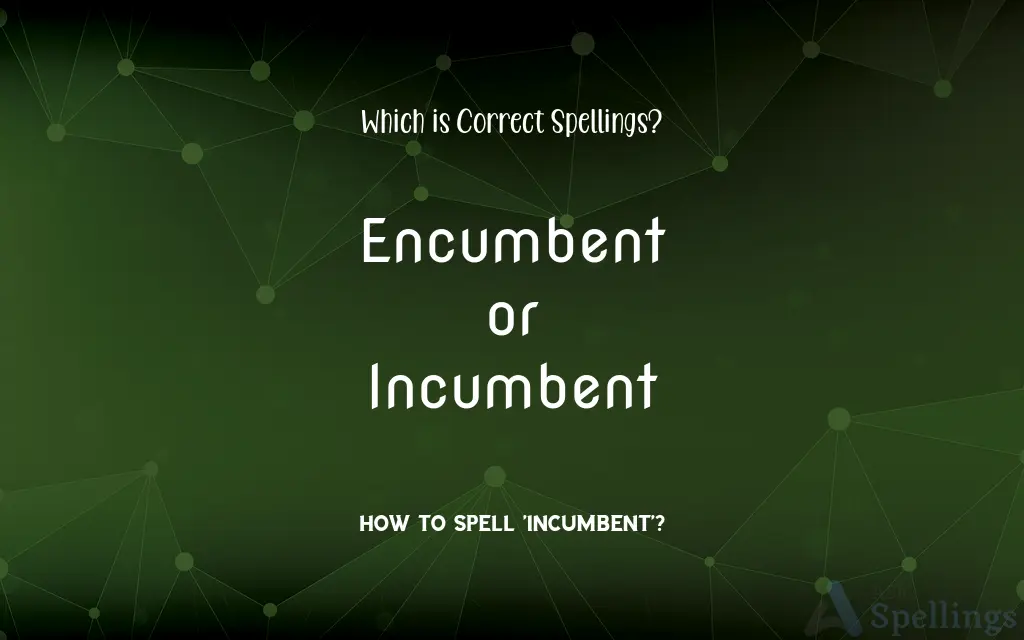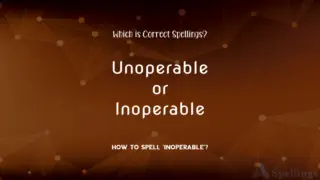Encumbent or Incumbent: Which is Correct Spellings?
Encumbent is the incorrect spelling of incumbent. An incumbent is a current officeholder or someone occupying a position.

Which is correct: Encumbent or Incumbent
How to spell Incumbent?

Encumbent
Encumbent Spelling

Incumbent
Incumbent Spelling
Table of Contents
Is it Encumbent or Incumbent
Remember that 'incumbent' starts with 'in-', just like 'incoming' to suggest someone currently holding a position.
Think of 'incumbent' containing 'umb' as in 'umbilical cord', a link to something existing.
Associate 'incumbent' with the prefix 'in-', commonly used in English to imply inclusion or presence within.
The 'cu' in 'incumbent' can be linked to 'current', highlighting the idea of currently holding office.
Split the word as 'in-cumb-ent' to simplify spelling and remember it as 'in (a) cumb(ent position)'.
How Do You Spell Incumbent Correctly?
Incorrect: He is running against the encumbent in the upcoming election.
Correct: He is running against the incumbent in the upcoming election.
Incorrect: Many believe the encumbent has an advantage in the election.
Correct: Many believe the incumbent has an advantage in the election.
Incorrect: This is her first challenge as an encumbent.
Correct: This is her first challenge as an incumbent.
Incorrect: The encumbent politician was very popular.
Correct: The incumbent politician was very popular.
Incumbent Definitions
A person currently holding an office or position, typically in politics.
The incumbent mayor faced tough competition.
Relating to or holding an incurred role or responsibility.
It’s incumbent upon the leaders to act decisively.
In a general context, someone who is currently holding a particular position or office.
The incumbent director has introduced several new policies.
Being the existing holder of a political office.
She ran a successful campaign to defeat the incumbent.
A holder of an office who has a considerable advantage during elections.
As the incumbent, he had access to more resources.
Incumbent Meaning in a Sentence
Being an incumbent provides various advantages during elections.
The incumbent often participates in community projects.
She has been the incumbent for two terms now.
The incumbent has a lot of influence in local government.
It's difficult to run against an incumbent because of their established presence.
His role as an incumbent is marked by significant educational reforms.
As the incumbent, he attends many public events.
The school welcomed advice from an incumbent board member.
She debated whether to challenge the incumbent in the next election.
The incumbent introduced a new health policy.
The debate tonight features the incumbent and two challengers.
The city’s residents showed great support for the incumbent during the rally.
The incumbent has to deal with both support and criticism.
In her speech, the incumbent emphasized unity and progress.
The incumbent has proposed several amendments to increase budget transparency.
During her term as incumbent, she focused on environmental issues.
Everyone expects the incumbent to win the primary election.
The incumbent is known for her transparency.
Many admire the incumbent for his consistent outreach.
She respects the incumbent for his long service.
Incumbent Idioms & Phrases
The power of the incumbent
Refers to the influence that current holders of a position possess.
The power of the incumbent is often visible in legislative changes.
Incumbent upon
Obligatory or necessary for someone as a duty or responsibility.
It is incumbent upon all of us to ensure the community's safety.
Defeat the incumbent
To win against the current officeholder in an election.
Defeating an incumbent is considered a significant political achievement.
The advantage of the incumbent
Describes the benefits that current officeholders typically enjoy, such as greater visibility and established relationships.
In many elections, the advantage of the incumbent is quite noticeable.
Vote out the incumbent
To elect someone else instead of the current officeholder.
The voters chose to vote out the incumbent due to dissatisfaction with their policies.
The responsibility of the incumbent
The duties and obligations that come with holding a current office.
The responsibility of the incumbent includes addressing public concerns effectively.
Campaign against the incumbent
To actively compete against the current officeholder in an election.
Her strategy to campaign against the incumbent focused on education and health.
Challenge the incumbent
To attempt to unseat the current officeholder in an election.
She decided to challenge the incumbent after seeing the community's needs go unmet.
Oppose the incumbent
To stand against the current officeholder in views or in an election.
He ran a strong campaign to oppose the incumbent.
Support the incumbent
To back the current officeholder in their role or during an election.
The party decided to support the incumbent in the upcoming election.
Re-elect the incumbent
To vote for the current officeholder in subsequent elections.
The community chose to re-elect the incumbent due to their effective policies.
The tenure of the incumbent
The duration or term of office held by the current officeholder.
The tenure of the incumbent has been marked by significant urban development.
Unseat the incumbent
To remove the current officeholder from their position through an election.
The opposition party's goal was to unseat the incumbent.
Incumbent-led initiatives
Projects or policies introduced by the current officeholder.
The incumbent-led initiatives have improved local infrastructure.
The challenge for the incumbent
The difficulties or opposition faced by someone currently in office.
The biggest challenge for the incumbent was the economic downturn.
The legacy of the incumbent
The lasting impact or achievements of the current officeholder after their term ends.
The legacy of the incumbent included major educational reforms.
The experience of the incumbent
The practical knowledge gained by being in office.
The experience of the incumbent was a critical debate point.
Backing the incumbent
Providing support for the current officeholder, often during electoral challenges.
The major donors are backing the incumbent.
Common Curiosities
What is a stressed syllable in incumbent?
The stressed syllable in incumbent is the second syllable, 'cum'.
How many syllables are in incumbent?
Incumbent has three syllables.
How do we divide incumbent into syllables?
Incumbent is divided into syllables as: in-cum-bent.
What is the pronunciation of incumbent?
Incumbent is pronounced as /ˈɪnkəmbənt/.
What is the singular form of incumbent?
The singular form is incumbent.
Why is it called incumbent?
Incumbent is called so because it derives from the Latin 'incumbere', meaning 'to lie down on', metaphorically used to mean 'occupy' a position or office.
How is incumbent used in a sentence?
Incumbent is used to describe someone currently holding an office or position, especially in politics.
What is the verb form of incumbent?
There is no verb form of incumbent; it is used as a noun and adjective.
What is the plural form of incumbent?
The plural form of incumbent is incumbents.
Is incumbent a noun or adjective?
Incumbent is both a noun and an adjective.
What is the root word of incumbent?
The root word of incumbent is the Latin 'incumbere', meaning 'to lie down on'.
What is another term for incumbent?
Another term for incumbent is 'officeholder'.
Is incumbent a countable noun?
Yes, incumbent is a countable noun when referring to persons holding a position.
Is the word incumbent a Gerund?
No, incumbent is not a gerund; it does not denote an action or a state of being as a verb does.
Is the word “incumbent” a Direct object or an Indirect object?
The word "incumbent" can be used as a direct object in sentences where it acts as a noun.
What part of speech is incumbent?
Incumbent is primarily used as a noun and adjective.
Is incumbent an adverb?
No, incumbent is not used as an adverb.
Is incumbent an abstract noun?
No, incumbent is a concrete noun when referring to a person; it is also used as an adjective.
Is incumbent a collective noun?
No, incumbent is not used as a collective noun.
Is the incumbent term a metaphor?
The term incumbent can be seen as metaphorical, originating from a Latin word meaning 'to lie down on', used to imply occupation of a position.
Which article is used with incumbent?
The definite article "the" is commonly used with incumbent.
What is the opposite of incumbent?
The opposite of incumbent could be 'challenger' or 'candidate'.
Is incumbent a negative or positive word?
Incumbent is a neutral word; it does not inherently carry a negative or positive connotation.
Is incumbent a vowel or consonant?
The word as a whole cannot be classified simply as a vowel or consonant.
Is the word incumbent imperative?
No, incumbent is not used in the imperative mood; it is a noun and adjective.
Which preposition is used with incumbent?
Common prepositions used with incumbent include "of" (as in "the incumbent of the office") and "on".
Which conjunction is used with incumbent?
Conjunctions like "and" or "but" can be used with incumbent in various contexts.
Which determiner is used with incumbent?
Determiners like "the", "an", or "no" can be used with incumbent depending on the context.
Which vowel is used before incumbent?
The vowel used before incumbent can vary, but commonly it is "the" or "an" based on the phonetic context.
Share Your Discovery

Previous Spelling
Tolerent or Tolerant
Next Spelling
Forseen or Foreseen



























